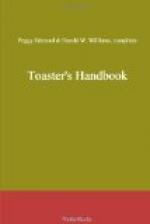On a pleasant Sunday afternoon an old German and his youngest son were seated in the village inn. The father had partaken liberally of the home-brewed beer, and was warning his son against the evils of intemperance. “Never drink too much, my son. A gentleman stops when he has enough. To be drunk is a disgrace.”
“Yes, Father, but how can I tell when I have enough or am drunk?”
The old man pointed with his finger. “Do you see those two men sitting in the corner? If you see four men there, you would be drunk.”
The boy looked long and earnestly. “Yes, Father, but—but—there is only one man in that corner.”—W. Karl Hilbrich.
William R. Hearst, who never touches liquor, had several men in important positions on his newspapers who were not strangers to intoxicants. Mr. Hearst has a habit of appearing at his office at unexpected times and summoning his chiefs of departments for instructions. One afternoon he sent for Mr. Blank.
“He hasn’t come down yet, sir,” reported the office boy.
“Please tell Mr. Dash I want to see him.”
“He hasn’t come down yet either.”
“Well, find Mr. Star or Mr. Sun or Mr. Moon—anybody; I want to see one of them at once.”
“Ain’t none of ’em here yet, sir. You see there was a celebration last night and—”
Mr. Hearst sank back in his chair and remarked in his quiet way:
“For a man who don’t drink I think I suffer more from the effects of it than anybody in the world.”
“What is a drunken man like, Fool?”
“Like a drowned man, a fool and a madman: one draught above heat makes him a fool; the second mads him; and a third drowns him.”—Shakespeare.
DYSPEPSIA
“Ah,” she sighed “for many years I’ve suffered from dyspepsia.”
“And don’t you take anything for it?” her friend asked. “You look healthy enough.”
“Oh,” she replied, “I haven’t indigestion: my husband has.”
ECHOES
An American and a Scotsman were walking one day near the foot of one of the Scotch mountains. The Scotsman, wishing to impress the visitor, produced a famous echo to be heard in that place. When the echo returned clearly after nearly four minutes, the proud Scotsman, turning to the Yankee exclaimed:
“There, mon, ye canna show anything like that in your country.”
“Oh, I don’t know,” said the American, “I guess we can better that. Why in my camp in the Rockies, when I go to bed I just lean out of my window and call out, ‘Time to get up: wake up!’ and eight hours afterward the echo comes back and wakes me.”
ECONOMY
An economist is usually a man who can save money by cutting down some other person’s expenses.
Economy is going without something you do want in case you should, some day, want something which you probably won’t want.—Anthony Hope.




